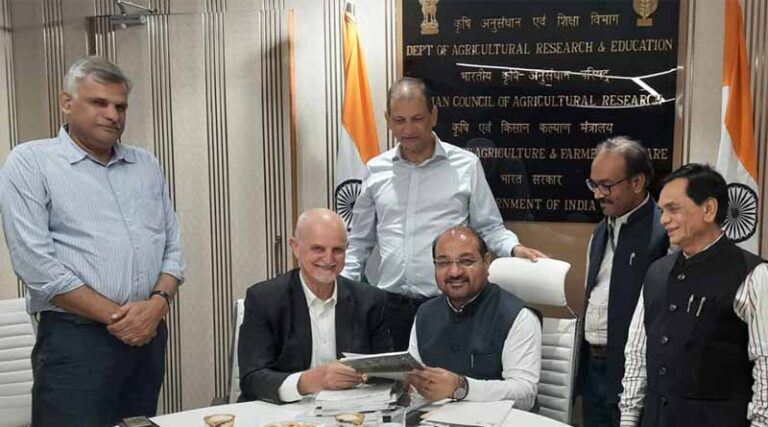
CIFOR-ICRAF Strengthens Partnerships In India
27 September 2025, New Delhi: In September 2025, Robert Nasi, director of science at the Center for International Forestry Research and World Agroforestry (CIFOR-ICRAF), travelled to India to meet with partners during a high-level visit. The visit reaffirmed the organization’s commitment to sustainable forestry and agroforestry in India and highlighted opportunities for future collaboration in research and practice.
CIFOR-ICRAF has a long history of engagement in the India, with ICRAF having a presence there since 2003. From 2021 to 2025, CIFOR-ICRAF led the implementation of the Trees Outside Forests in India (TOFI) programme — a joint effort of USAID and the Indian government’s Ministry of Environment, Forest and Climate Change (MoEFCC).
In India, Nasi was joined by Senior Advisor Ravi Prabhu, Country Director Manoj Dabas and Senior Fellow Shiv Kumar Dhyani. Their visit began with a meeting at the Ministry of Environment, Forest and Climate Change (MoEFCC) headquartered in New Delhi with Shri Sushil Kumar Awasthi, director general of the ministry.
Discussions focused on fostering institutional collaboration between CIFOR-ICRAF, the Ministry and the Indian Council of Forestry Research and Education (ICFRE). This included sustaining selected initiatives developed under TOFI, which ended following USAID’s closure.
Nasi and the CIFOR-ICRAF India team also invited the Ministry to participate in TREESCAPES 2026 — the inaugural South Asian Agroforestry and Trees Outside Forests Congress — which is scheduled for February 2026 in New Delhi. The three institutions further agreed to initiate a tripartite agreement and collaborate on state-specific agroforestry policy development.
Later, the delegation met with M. L. Jat, secretary of the Department of Agricultural Research and Education (DARE) and Director General of the Indian Council of Agricultural Research (ICAR), Ministry of Agriculture & Farmers’ Welfare at Krishi Bhawan. The meeting laid the groundwork for the new ICAR-ICRAF. Collaborative Work Plan 2026-2030, set to replace the current plan ending December 2025.
In outlining the broad themes of the new work plan, the delegates emphasized that the health of agricultural landscapes is closely tied to forest biodiversity. They noted that advancing innovation in forest and landscape management will be essential for addressing major global challenges — including climate change, gender and social inequalities, rural poverty and ecosystem conservation.
The partners also identified several key areas of focus for future research. These included studying how trees influence local climate conditions, selecting species suited to specific agro-climatic zones to support farmers and testing compatible combinations of various crop varieties with different tree germplasms to enhance productivity and resilience.
The following day, at the ICAR-Central Agroforestry Research Institute (CAFRI) in Jhansi, the team reviewed joint activities under the current ICAR-CAFRI and CIFOR-ICRAF Work Plan. The delegation recognized the institute’s potential to evolve into a Centre of Excellence, with CIFOR-ICRAF’s support.
The delegation also visited Rani Lakshmi Bai Central Agricultural University (RLBCAU) in Jhansi, where they were welcomed by the institution’s vice chancellor Ashok Kumar Singh, along with other senior faculty members.
There, Nasi stressed the significance of forestry research, agroforestry and sustainable land use to tackle climate change and livelihood challenges, while Prabhu and Dabas shared CIFOR-ICRAF’s initiatives and prospects for partnership in agroforestry, carbon farming and farmer-centric innovations. Singh reaffirmed RLBCAU’s commitment to international collaboration in sustainable agriculture and forestry.
“This visit reaffirms the importance of working hand in hand with national institutions like ICAR in India, a country recognised as a global leader in agroforestry,” said Nasi. “Through stronger collaboration with ministries, government departments and national research & academic institutions, we can address today’s interconnected challenges of climate change, livelihoods and biodiversity.”
“This was a timely opportunity to deepen our partnerships and chart a way forward for research and practice in India,” said Dabas. “Building on the legacy of our work and our long-standing presence in the country, we are committed to supporting state-level agroforestry policies, advancing farmer-focused innovations and preparing for TREESCAPES 2026. These efforts will place trees at the heart of farming systems and help create resilient landscapes and thriving livelihoods.”
Also Read: Tropical Agro Unveils AI – Enabled Tech Tools To Tackle India’s 7 Million Tonnes Fruit Loss Problem
📢 If You’re in Agriculture, Make Sure the Right People Hear Your Story.
From product launches to strategic announcements, Global Agriculture offers unmatched visibility across international agri-business markets. Connect with us at pr@global-agriculture.com to explore editorial and advertising opportunities that reach the right audience, worldwide.






